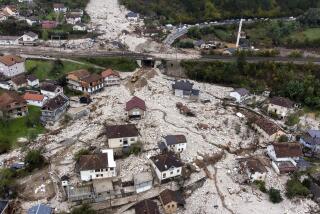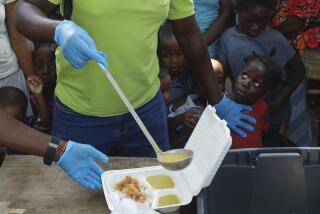In Kosovo, ‘Well-Planned Violence’
UNITED NATIONS — The U.N.’s chief humanitarian coordinator, returning from his first assessment mission to Kosovo, told the Security Council on Wednesday that “a rampage of killing, burning, looting, forced expulsion, violence, vendetta and terror” grips the Serbian province--and that the mayhem appeared to be systematic.
“Even allowing for spontaneous, uncontrolled brutality, the team collected indisputable evidence of organized, well-planned violence against civilians aimed at displacing and permanently deporting them,” said Undersecretary-General Sergio Vieira de Mello, calling for an urgent investigation.
For the record:
12:00 a.m. June 4, 1999 For the Record
Los Angeles Times Friday June 4, 1999 Home Edition Part A Page 3 Metro Desk 2 inches; 40 words Type of Material: Correction
Aid to Kosovo--Two articles in Thursday’s paper each referred to a relief agency’s plans to airdrop food supplies into Kosovo, but one of the stories gave the agency’s name incorrectly. The agency undertaking the food drops, which began Thursday, is the International Rescue Committee.
As ambassadors from 15 nations listened closely to his stark descriptions, de Mello said his team traveled extensively in Kosovo for three days and found “a depressing panorama of empty villages, burned houses, looted shops, wandering livestock and unattended farms.”
Most disturbing, he said, were “clear signs that inhabitants fled on very short notice, probably in terror.”
Mission members witnessed two separate incidents of house-burning in areas where no fighting was occurring, which “undermined official explanations that most damage had been caused in firefights between Yugoslav forces and [Kosovo Liberation Army rebels],” de Mello said.
Emerging from the council session, U.N. Secretary-General Kofi Annan said the briefing underscored the scope of the humanitarian crisis and the “magnitude of the task that needs to be done.”
The Kosovo trip was part of a larger tour of Yugoslavia, during which the team also found “ample evidence” of serious damage from the North Atlantic Treaty Organization’s bombing campaign.
Primary concerns throughout Serbia, the dominant republic of Yugoslavia, are civilian casualties, unemployment reaching crisis proportions, health hazards, extensive damage to electrical generating facilities, closed schools and universities and the psychological problems of an anxious population, he reported.
The U.N. official said a feeling existed of “ever-present danger from the sky from an invisible enemy.”
In his remarks to reporters after the meeting, de Mello said airdrops of food by the International Refugee Committee--which are scheduled to begin today--will help, but not solve, the hunger problem of Kosovo’s 450,000 displaced people. Negotiations were underway in the Yugoslav capital of Belgrade to permit convoys carrying humanitarian supplies into Kosovo, he said.
“Our mission was a first, however small, step in reopening a humanitarian space in Kosovo,” de Mello told the council in the closed session. His briefing notes were later made public.
“The secretary-general is looking into the possible return of U.N. humanitarian personnel--which the federal and provincial authorities would welcome--subject to security considerations,” he added.
De Mello said his team, made up of representatives of U.N. agencies and nongovernmental organizations, “attempted to navigate a careful course” to maintain its nonpolitical and strictly humanitarian focus. The members met with government officials, opposition politicians, doctors, plant managers, refugees, the diplomatic corps in Belgrade and ordinary citizens.
Access and freedom of movement in Kosovo was “more than expected but less than requested,” de Mello said. In Pristina, the Kosovo capital, little destruction is visible and about one-third of the population remains, he said. But in some areas, 80% of the homes had been burned.
De Mello urged that the plight of the estimated 500,000 refugees who fled Croatia and Bosnia-Herzegovina in 1995 not be overshadowed by the Kosovo crisis.
He warned the Security Council that the humanitarian situation in Kosovo, as well as in the rest of Yugoslavia, will dramatically deteriorate unless the conflict ends soon.
“The repatriation of refugees will become increasingly difficult with the passing of time and as winter approaches. The longer they remain abroad, the less likely they will be to return,” de Mello said.
More to Read
Sign up for Essential California
The most important California stories and recommendations in your inbox every morning.
You may occasionally receive promotional content from the Los Angeles Times.










